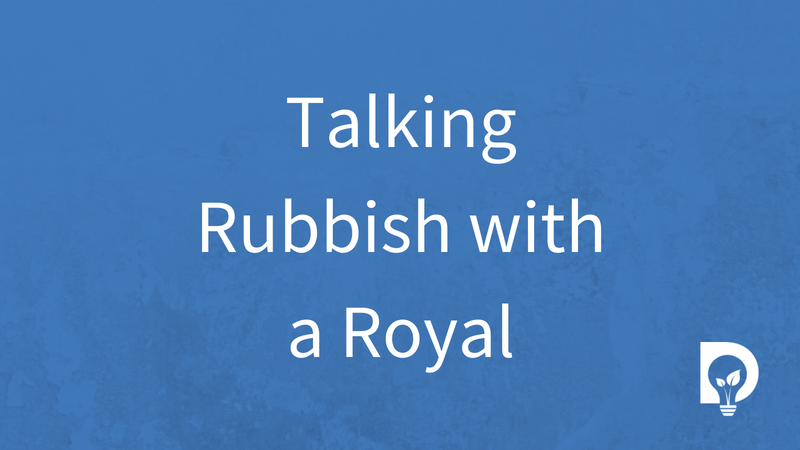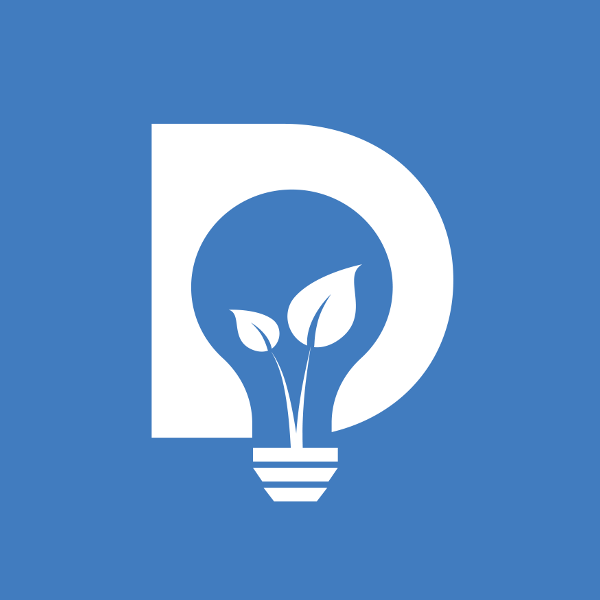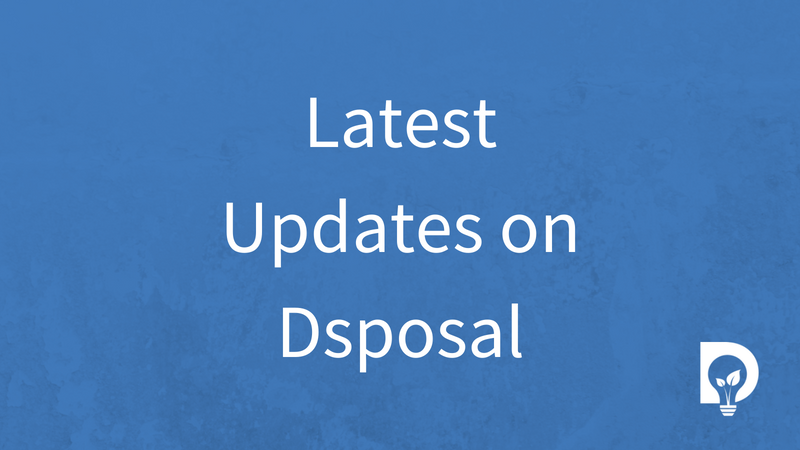
We've had to keep it under wraps for the last couple of months but we can now announce, with much excitement, that Dsposal is one of the 5 companies working with the GovTech Catalyst to develop innovative digital solutions to tackle the challenge of tracking waste from its source through its treatment and final disposal. We're calling it KnoWaste.
What is KnoWaste?
The KnoWaste project is designed to bring a smart waste solution in two parts. The first is a simple, free to use waste app. This can be used by any person or organisation to deal with their waste correctly. We enable the whole waste job to be handled in the app. From picking a licensed waste company to checking their credentials and paying for the job when it’s been carried out compliantly. Everyone along the waste pathway benefits.
The second part of KnoWaste is the design of an open data standard for waste on which will be built a central database (see the KnoWaste Standard on Github). Using a standard means that we can gather better quality data which will help us all meet the ambitions in the Resources and Waste Strategy. This single central database will connect the separate systems currently in use, providing the regulators with the oversight they need and the industry with the insight it requires.
The Dsposal KnoWaste project team is strengthened by working with partner organisations – Open Data Manchester and The University of Bradford, an Ellen MacArthur Foundation ‘Pioneer University’ – to enhance and ground the project.
We'll be sharing a lot more about this project in the coming months, but for now, here's a 10 minute video giving you an overview.
KnoWaste Webinar Transcript
Hi, I'm Sophie Walker. I'm the COO of Dsposal and I'm here to talk to you about our simple idea to solve a rubbish problem. So Dsposal is a clean tech start-up working towards the world where all waste is treated as a resource.
But that's not currently where we are at the moment. Waste crime cost the country over £600 million a year and dumped waste rarely makes it back into the system as a resource. And so far it's been a pretty low-risk, high-reward situation exacerbated by very low levels of awareness around waste regulation by the wider public. So, our research conducted by YouGov in Greater Manchester showed that 49% of adults didn't know that waste removal services needed to be licensed. And in a study by Right Waste Right Place campaign even businesses were unaware of their duty of care with 48% of them not knowing where their waste goes once it leaves their premises.
Criminals Are To Blame
So obviously the blame lies with the waste criminals but as the Defra review into serious and organised crime in the waste industry pointed out. The lack of digital systems can be exploited by criminals who can easily hide evidence of mishandled waste and we also think that it allows them to more easily confuse unwitting members of the public and businesses. We believe technology can help solve this problem and we're delighted to see it included in the Resources and Waste Strategy.
So What is Our Solution?
So at Dsposal we build easy-to-use tech to connect all waste producers to licensed waste services and make compliance simple. We believe in making the relevant data accessible and convenient and driving behaviour change and creating value by maximising the utility of waste. So waste streams flow between companies and countries but the data and the paperwork doesn't and we want to digitally connect the industry by digitising the transactions and documents. By simplifying waste compliance and making it easy to do the right thing we'll transform the system from one where you have to hope that people will do the right thing to one where the right thing is also the easiest thing. So that's what we mean when we say that we want to make a system of "passive compliance" so through digitisation we can begin to gather real data on waste and that means we can start to see patterns and look for economies of scale that turn those waste streams into valuable resources and when we can start to see those material flows we can really drive the transition to a circular economy.
What is Dsposal Now?
Compliance
So Dsposal as it is now it's made up of three main modules. The first is all about compliance we created a series of articles and advice to help people with some common compliance issues. But the main thing is that we've done is that we've built a waste thesaurus to help people correctly classify their waste. So there's tens of thousands of keywords against the 842 European Waste Catalogue Codes (the EWC codes) so when you search for mattress it helps you to find out that it's either EWC code 20 03 07 which is a bulky waste or a 20 01 11 which is textiles. So no other freely accessible interactive tool like this exists and we get a lot of positive feedback from users about it.
Directory
So the second module is our directory of licensed waste services we use the Environment Agency public registers database so you can only get on Dsposal if you are licensed. We then ask those waste companies to claim their profiles and add additional info like their waste permits and insurances, accreditations, certificates (maybe like ISO 14001). So we can link the EWC codes from their permits to the waste thesaurus so when a certain user searches for mattress in Manchester for example it will return those that have licences to handle that waste. So the user can then check out the company's insurances, accreditations and services and if they like the look of them they can send them a quote request. And if they use a company regularly they can also follow them to keep up to date with their compliance which takes us onto our dashboard.
Dashboard
So here you get a really quick overview of all of your waste companies, your notifications and any enquiries that you've got going on. So with a simple colour-coded visual you can quickly spot if any of the companies that use have any expired documents. And this is sort of reinforcing that idea of passive compliance. We've also built a semi-automated duty of care audit tool with input from CIWM and Right Waste Right Place so anyone you don't have to be a waste specialist anyone can be guided through how to do a waste audit on a on a company
Our Vision with KnoWaste
So that's what we've built already but what's our vision for this smart waste tracking project. So our waste is interconnected and it moves from waste producers to waste carriers and then on to waste sites. And as the waste flows along one-way paperwork invoices and information is passed back the other way. So we see a world where these movements the paper where the transactions and the information all happen in one place and this place is what we're calling KnoWaste. We love plays on words! So built on secure cloud services KnoWaste will connect the separate systems currently in use providing the regulator the oversight that they need and the industry with the insight that it requires. KnoWaste will help everybody in the chain really understand their waste and once this data is verified. It will be aggregated, anonymized and made available as open data, because the more eyes that we have on this information. The more good it can do. Which will help all of us meet the ambitions in the Resources and Waste strategy.
Four Pillars of KnoWaste
So KnoWaste is built on four key pillars:
Know - So gathering all the data sets identifying and plugging waste data gaps and through producing a digitised audit trail of the entire waste pathway and integration has been a key requirement that stakeholders have expressed.
Interact - So it's crucial that any new system integrates with the existing workflows used by various stakeholders in the sector and by creating API's to a centralised database built on open data standards.
Transact - We believe that by digitally connecting the industry all waste transactions can be recorded centrally and we can move to a system where paid for waste transactions throughout the supply chain can flow through the system saving time and cost for businesses and individuals.
Reward - Well we want the system to be able to reward or incentivise the right behaviour. And this could be through the development of smart contracts that can tie payments to fulfilment of contractual and regulatory duties. But it could also incentivise moving up the waste hierarchy, which could see increased value in our resources and promote a resource marketplace.
Overlapping Solutions
Because of the scope of the waste industry and the inherent challenges, we envisage it's a two part solution. One is an easy-to-use web app covering the whole waste management pathway which could be used by anyone along the pathway. From householders, to skip companies. From offices, to regional waste operators and from manufacturers to reprocesses. So the app could be used by anyone. But we understand that some companies already have their own similar solutions in place, so we're not seeing this as an app that has to be used by everyone. Instead it offers a free-at-point-of-use digital solution to those that don't have their own software. So that no one is left behind in the transition to a digital system.
The app will be built on an open data standard and centralised database which will have API's for integrations with the current systems used by the industry and allow different levels of access to that data so the record level data will be security protected with limited access. But there will be open, anonymised, aggregated data which we believe will encourage innovation around resource material flows and accelerate the move to a circular economy.
Human Centred Approach
So understanding and designing for user needs is central to our approach. So we've been holding collaborative stakeholder workshops built on human centred design principles to explore the issues with those who feel them first-hand. And we've been testing our assumptions and really trying to get to the bottom of how the system currently works and where the complexities are. Which is everywhere! And how we can design solutions that meet these challenges and deliver value to everyone along the waste pathway.
Narrowing the Scope of KnoWaste
So because this is just a three-month study we needed to narrow down the scope of our research but we still wanted to make sure that what we researched would be applicable across the industry. So we're using facilities management sites as our test case. In the first instance we're focusing on what you might see as traditional facilities management. So we're fortunate to be working with Manchester Science Partnerships and Bruntwood. So we're looking at an office building and a Science Park. And we picked this for a number of reasons, but the biggest is that despite being a distinct sector FM sites host almost every industry and therefore interact with a very wide array of waste streams. Facilities management sites also hosts a variety of tenants from freelancers working in co-working spaces and hotel guests, to large multi-site operations including factories and hospitals. So FM companies also act as "de-facto" waste holders for their clients and often struggle to engage tenants in waste management initiatives and also face challenges in providing transparency around duty of care and these issues are ones that are faced in the wider industry.
The KnoWaste Team
So I've told you a bit about Dsposal and why we think we've got a good foundation to build this project from. But it's a big complex problem which requires a massive joined up solution and we don't profess to be experts in all the fields required to get there. So we're delighted to be working with the University of Bradford Faculty of Management and Law who are an Ellen MacArthur Foundation "Pioneer University". As such they have a wealth of experience in the Circular Economy, as well as supply chain business management and of course research. So we're also really lucky to be working with Open Data Manchester who are experienced in working with and creating open standards. They work regionally, nationally and internationally with a range of partners from civil society to governments. So that's our project.
Thank you very much for listening.
You can find us at our web address and we're on twitter @YourDsposal and if you have any questions about this project please email wastetracking [at] defra [dot] gov [dot] uk thanks very much.


